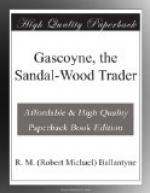He seized the first piece of wood that came in his way, and clung to it. For many hours he was driven about and tossed by the winds and waves until he began to feel utterly exhausted; but he clung to the spar with the tenacity of a drowning man. In those seas the water is not so cold as in our northern climes, so that men can remain in it for a great length of time without much injury. There are many instances of the South Sea islanders having been wrecked in their canoes, and having spent not only hours but days in the water, clinging to broken pieces of wood, and swimming for many miles, pushing these before them.
When, therefore, the morning broke, and the bright sun shone out, and the gale had subsided, Henry found himself still clinging to the spar, and, although much weakened, still able to make some exertion to save himself.
On looking round he found that numerous pieces of the wreck floated near him, and that the portion to which he clung was the broken lower mast. A large mass of the deck, with part of the gunwale attached to it, lay close beside him, held to the mast by one of the shrouds. He at once swam to this, and found it sufficiently large to sustain his weight, though not large enough to enable him to get quite out of the water. While here, half in and half out of the water, his first act was to fall on his knees and thank God for sparing his life, and to pray for help in that hour of need.
Feeling that it would be impossible to exist much longer unless he could get quite out of the water so as to allow the sun to warm his chilled frame, he used what strength remained in him to drag towards him several spars that lay within his reach. These he found to be some of the rough timbers that had lain on the deck of the cutter to serve as spare masts and yards. They were, therefore, destitute of cordage, so that it was not possible to form a secure raft. Nevertheless, by piling them together on the top of the broken portion of the deck; he succeeded in constructing a platform which raised him completely out of the water.
The heat of the sun speedily dried his garments, and as the day wore on the sea went down sufficiently to render the keeping of his raft together a matter of less difficulty than it was at first. In trying to make some better arrangement of the spars on which he rested, he discovered the corner of a sail sticking between two of them. This he hauled out of the water, and found it to be a portion of the gaff. It was a fortunate discovery; because, in the event of long exposure, it would prove to be a most useful covering. Wringing it out, he spread it over the logs to dry.
The doing of all this occupied the shipwrecked youth so long that it was nearly midday before he could sit down on his raft and think calmly over his position. Hunger now began to remind him that he was destitute of food; but Henry had been accustomed, while roaming among the mountains of his island home, to go fasting for long periods of time. The want of breakfast, therefore, did not inconvenience him much; but before he had remained inactive more than ten minutes, the want of sleep began to tell upon him. Gradually he felt completely overpowered by it. He laid his head on one of the spars at last, and resigned himself to an influence he could no longer resist.




